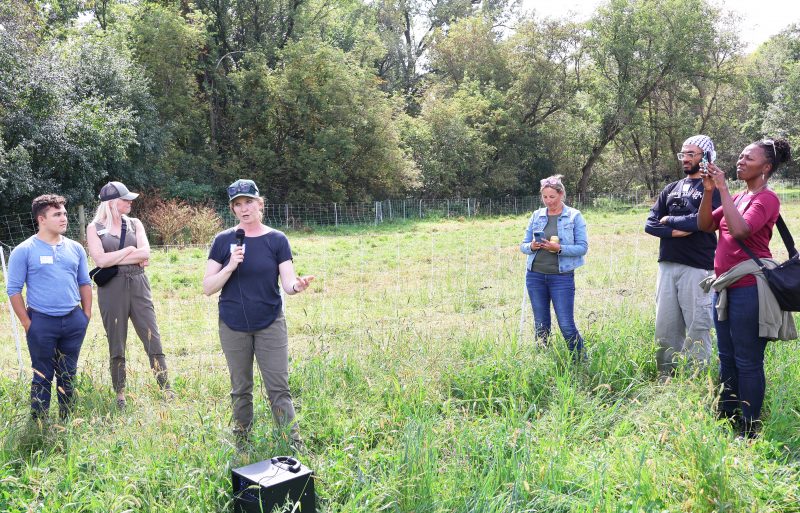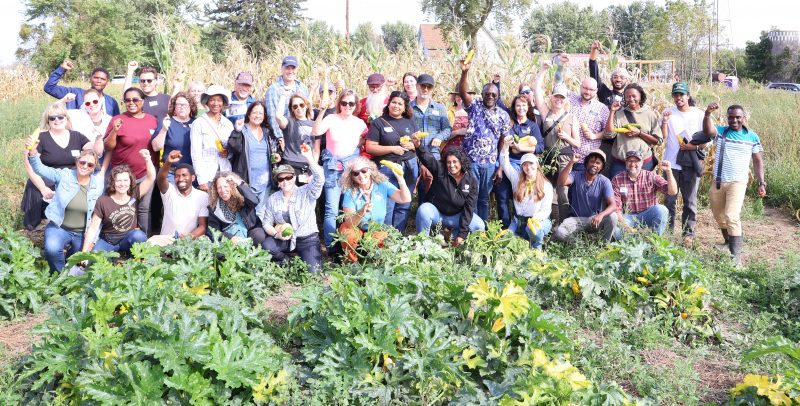CANNON FALLS, Minn. — Shea-Lynn Ramthun stood in a recently harvested oat field on her family’s farm near Cannon Falls last week and described to a couple dozen lawmakers a dilemma that’s all-too-common in the agriculture business: she had just successfully raised a bumper crop, only to run into the brick wall of not having access to buyers who will pay a good price.
“As a farmer, I want to produce really sustainable, healthy food for my family and community,” said the sixth-generation crop and livestock producer. “But farmers need to be able to have access to markets.”

Ramthun’s Flying J Farm was one stop on a legislative tour sponsored by State Innovation Exchange (SIX), a group that works with state lawmakers across the country to connect and strategize together on how to move public policy that prioritizes the health of communities and climate action, among other things. Last week, 23 lawmakers from nine states — Minnesota, Iowa, Wisconsin, South Dakota, Michigan, Tennessee, Nebraska, Illinois and Missouri — toured farms in southeastern Minnesota as part of a week of activities groups like SIX and the Land Stewardship Project were holding in the run-up to the 40th Anniversary Farm Aid festival Sept. 20 in Minneapolis. Many of the lawmakers participating in the farm tour serve on agriculture and natural resources legislative committees in their respective states.
Less than an hour’s drive south of Ramthun’s farm near Rochester, Minn., a group of Kenyan immigrants explained to the lawmakers that access to consistent, profitable markets is also a challenge for them, even though they are raising vegetables, not grain.
“You can see there are a lot of vegetables, but we don’t have a market at this time,” said Gilbert Obiero, pointing at thriving produce plots behind where the lawmakers were standing.
Obiero and four other partners in the Farmland Produce operation farm 11 acres they’re renting from a local corn-soybean farmer. Most of the farmers who make up the cooperative have health care backgrounds, and they explained to the lawmakers that since starting the farm last year their focus has been to produce nutritious, fresh food for the community. However, because of lack of access to good, consistent markets, they often end up giving the food away.
The farmers also described how access to land is another major barrier to the long-term viability of their business. They have received support from Rochester’s Village Agricultural Cooperative to set up infrastructure such as a packing shed and washing station, but because they are on a year-to-year lease, it’s difficult for them to plan and put in place long-term infrastructure.
“Most of the challenges we have are around land access,” said Benson Arama, one of the farmers. “If we had our own land, we could make a plan and produce in the long term.”
Moses Momanyi, who farms north of the Twin Cities, has been working with dozens of African immigrants in the state to help them gain access to land and markets. He said that funding provided by the Minnesota Legislature to support food hubs, farm to school purchases and farmland access for beginning farmers has been of great benefit to the farmers he works with. But as more emerging farmers enter agriculture, the need for support is growing. He encouraged the lawmakers on the tour to find ways to support operations like Farmland Produce, which should be seen as a business that benefits the public good by providing healthy food in an environmentally sustainable manner.
A farmer panel held at Ramthun’s operation near Cannon Falls also focused on the theme of how public policy can encourage farmers to produce food in a way that’s good for the community. Ramthun said that interseeding nitrogen-fixing red clover into her oats is helping reduce her farm’s reliance on fertilizer, which saves money and benefits water quality. Besides being a farmer, she also works as a soil health organizer for the Land Stewardship Project; in that role she helps farmers in Minnesota and Iowa adopt practices such as cover cropping, no-till, diverse rotations and managed rotational grazing.
“I hear from a lot of farmers about the need for market access to make soil health and diversifying profitable,” she told lawmakers.
Matthew Bormann, who raises corn and soybeans in northern Iowa’s Kossuth County, encouraged lawmakers to work with and listen to farmers who are willing to practice conservation but are frustrated about being stuck in a system that encourages heavy tillage and chemical use.
“We’re sick of watching all our soil wash downstream,” he said.
Zack Smith, a crop farmer in Iowa’s Winnebago County who previously worked selling seeds and agricultural chemicals, said current policies that focus on voluntary measures to clean up water in rural areas are not working.
“I understand the machine pretty well and what we’re up against as far as changing things for the better,” he said. “How do we come up with solutions which will be driven by people like you who are the policy makers to actually have meaningful change in the landscape?”
Martin Larsen, who farms in Minnesota’s Olmsted County and also tracks nitrate runoff as a caver and an employee of the Soil and Water Conservation District (SWCD) there, says his research shows integrating a crop like oats into the corn-soybean rotation dramatically reduces nitrate pollution of groundwater. However, both he and Ramthun described the frustration of not having Minnesota-based companies like General Mills supporting a more diversified agriculture by purchasing homegrown oats; instead major processors procure the majority of their oat supply from Canada.
One example of how public policy can support a more diversified agriculture is taking shape in Albert Lea, Minn., said Ramthun. A group of 110 farmers, including Ramthun and Larsen, have invested in an oat processing facility that broke ground this spring and is scheduled to go online in August 2026. The facility will serve as a market for 40,000 acres of oats annually in southern Minnesota and northern Iowa, which could translate into significant economic and environmental benefits for the region. The organizers of the Green Acres Milling initiative originally wanted to build the facility in Iowa, but the Minnesota Department of Agriculture, working with the USDA, was able to provide an infrastructure grant that helped bring the business to this state, said Matt Kruger, a farmer who works for Green Acres.
That kind of public support is important at a time when diversifying a rotation can come with certain economic and agronomic risks for farmer who are deeply embedded in the corn-soybean system, said the farmer-panelists.
“We need policies, and we need leverage put on these private companies to provide the markets required to de-risk that transition for farmers,” said Larsen. “That’s the only way we’re going to fix the nitrate problem in southeast Minnesota.”
-30-
The Land Stewardship Project (LSP) is a nonprofit organization dedicated to fostering an ethic of stewardship for farmland, promoting sustainable agriculture and developing healthy communities in the food and farming system. LSP has offices in the Minnesota communities of Montevideo, Lewiston and South Minneapolis.
